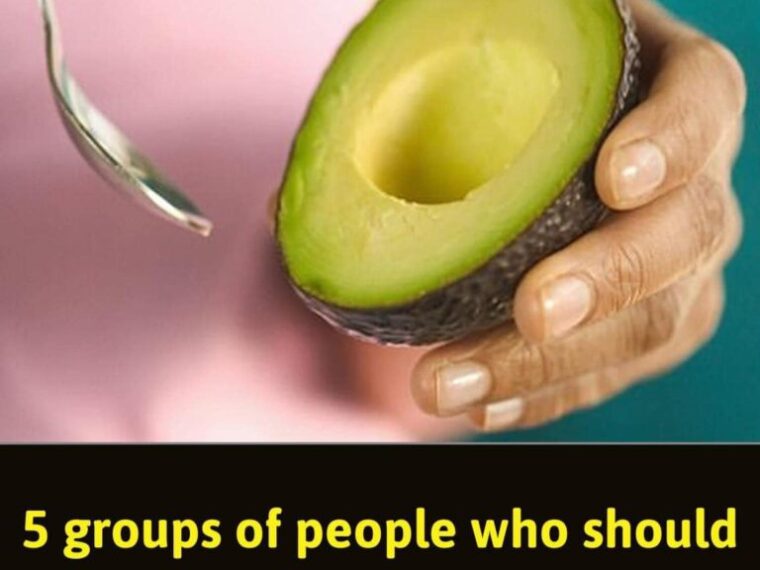Avocados have earned a reputation as a healthy, nutrient-dense food. Packed with healthy fats, fiber, vitamins, and minerals, they’re a go-to snack for many. However, despite their health benefits, there are certain groups of people who should avoid avocado—no matter how much they crave it. If you belong to one of these groups, you may want to rethink your avocado intake to avoid potential health complications.
1. People with Avocado Allergy or Sensitivity
Although relatively rare, some individuals are allergic to avocados or have a sensitivity to certain proteins found in them. These proteins can trigger allergic reactions, ranging from mild to severe.
Symptoms may include:
- Skin rashes or hives
- Itchy throat or mouth
- Swelling of the lips or tongue
- Stomach cramps, nausea, or vomiting
For individuals with a confirmed avocado allergy, it’s crucial to completely avoid the fruit, as the reaction can worsen with repeated exposure. People with latex allergies are also at a higher risk of developing an avocado allergy, as latex and avocados share similar proteins.
2. People with Digestive Disorders (Like Irritable Bowel Syndrome)
Avocados are high in fiber, which is great for most people as it helps maintain a healthy digestive system. However, for those with certain digestive disorders, such as Irritable Bowel Syndrome (IBS) or gastrointestinal (GI) issues, the fiber in avocados can sometimes cause discomfort.
Why it might be a problem:
- Avocados contain a type of sugar called sorbitol, a FODMAP (fermentable oligosaccharides, disaccharides, monosaccharides, and polyols), which can lead to bloating, gas, and diarrhea in people with IBS or other gut sensitivities.
If you’re prone to digestive discomfort, it’s best to limit your intake of avocados or opt for small portions to see how your body reacts.
3. People on a Low-Potassium Diet
Avocados are incredibly rich in potassium—a mineral that plays a crucial role in maintaining heart health and regulating fluid balance. However, for those with kidney disease or those on a low-potassium diet, consuming too much potassium can be harmful.
Why it’s a concern:
- Excess potassium can strain the kidneys and lead to serious health issues like hyperkalemia, a condition where potassium builds up in the bloodstream and disrupts heart rhythms.
If you’re managing kidney disease or have been advised by your healthcare provider to limit potassium intake, you may need to avoid avocados or monitor your portions carefully.
4. People on a Calorie-Restricted Diet
Avocados are calorie-dense due to their high fat content, which, while healthy, can add up quickly if you’re trying to lose weight or maintain a calorie-restricted diet. One medium-sized avocado contains around 250-300 calories, which can take up a significant portion of your daily calorie intake.
Why it may be problematic:
- While the fats in avocados are mostly heart-healthy monounsaturated fats, consuming too many avocados without adjusting for other calorie-dense foods may hinder weight loss efforts or lead to unwanted weight gain.
For those who are counting calories or following a strict weight-loss plan, it’s important to enjoy avocado in moderation, depending on your daily calorie goals.
5. People with Certain Heart Conditions (Due to High Fat Intake)
While avocados contain healthy fats, individuals with certain heart conditions, particularly those with high triglycerides or elevated LDL cholesterol, might need to limit their fat intake—even from healthy sources.
Why it could be problematic:
- For people with hyperlipidemia or heart disease, reducing the intake of dietary fats, even healthy ones, is often recommended to help manage cholesterol levels and reduce the risk of heart attacks or strokes.
- While the fats in avocados are mostly monounsaturated (considered healthy), it’s important to consider the total fat intake in your diet. For those on heart disease management plans, working with a nutritionist to ensure balanced fat consumption is crucial.
Conclusion: Moderation is Key
While avocados offer a wealth of nutrients, they’re not suitable for everyone. People with allergies, digestive issues, kidney disease, specific calorie restrictions, or certain heart conditions should be cautious about including them in their diet. As always, if you’re unsure whether avocados are safe for you, it’s a good idea to consult with a healthcare provider or dietitian who can offer personalized advice based on your health needs.
For those who can enjoy them, avocados remain a fantastic, nutrient-packed addition to any balanced diet!
